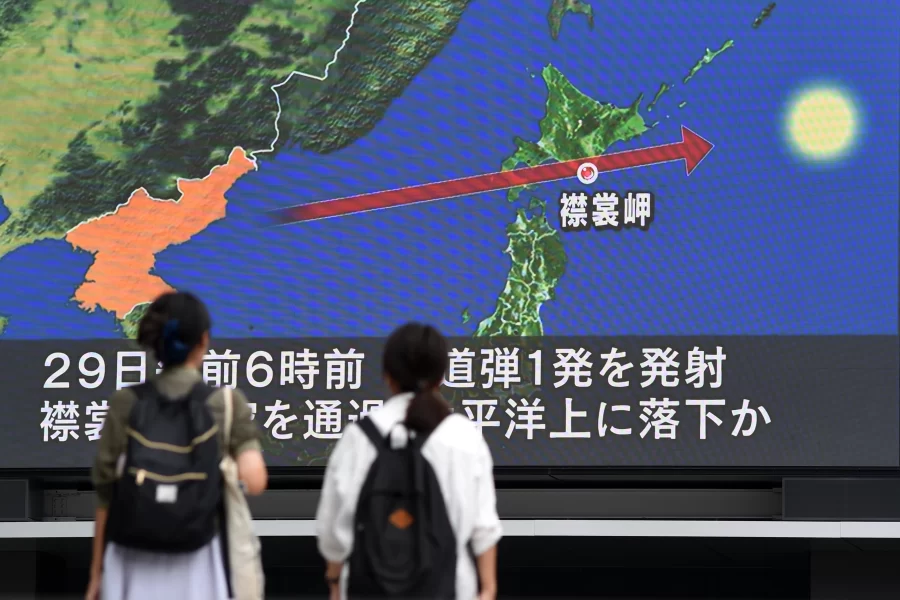North Korea Fires Ballistic Missile Over Japan
North Korea has fired a ballistic missile over Japan on Tuesday morning around 7:46 a.m. local time (6:46 p.m. ET). The missile crashed into the Pacific Ocean after entering Japan’s aerospace. This is the first time North Korea has launched a missile over Japan since 2017, and the 23rd missile test conducted this year. The missile traveled 2,860 miles and fell into the Pacific Ocean. This is the farthest a North Korean missile has been launched.
The missile was fired in the direction of Hokkaido, Japan’s northernmost main island and flew over the Aomori prefecture. Local residents in Hokkaido and Aomori were advised to take shelter and to “not approach anything suspicious that is found and to immediately contact the police or fire department” in a tweet posted by Japan’s Prime Minister.
Japanese trains in the area were temporarily suspended during the test. The Japanese government has said that no aircraft or ship damages have occurred during the test. They also said that more information is still being gathered and analyzed.
Firing over or past Japan allows North Korean scientists to test missiles under more realistic conditions, said Ankit Panda of Carnegie Endowment for International Peace.
Japan did not attempt to shoot down the missile and analysts have said that this was the best decision to not reveal Japan’s capability or incability. A missed attempt at shooting down the missile would create panic within Japan.
South Korea’s Joint Chiefs of Staff (JCS) said that the missile appeared to be an intermediate-range ballistic missile (IRBM) launched from North Korea’s Jagang Province. North Korea has used that province to launch several recent tests, including multiple missiles that it claimed were “hypersonic.” This has not been verified by any sources outside of North Korea.
This missile test is the fifth round of North Korea’s nuclear weapons testing in the last 10 days.The last four rounds were testing short range missiles capable of reaching targets within South Korea.
These weapons testing have been speculated as retaliation to the United States and South Korea, which conducted trilateral anti-submarine exercises last week with Japanese naval forces. The USS Reagan aircraft carrier has also arrived in Busan, South Korea as a warning that U.S. forces are present in South Korea.
South Korea has conducted targeted F-15K “precision” bombing practice, according to Seoul’s JCS. The practice was reported at 5:46 pm (KST) on Tuesday evening in retaliation to the North’s missile tests. On Saturday, South Korea flaunted its own show of advanced weaponry on Armed Forces Day including multiple rocket launchers, drones, main battle tanks, ballistic missiles, and F-35 fighters.
Analysts speculate that an even bigger test will be conducted after China’s mid-October Communist Party Congress. “North Korea is going to keep conducting missile tests until the current round of modernization is done. I don’t think a nuclear explosion is far behind,” said Jeffrey Lewis, director of the East Asia Nonproliferation Program at the Middlebury Institute.
North Korea’s nuclear weapons testing is banned by the U.N. security council and has been warned countless times about the consequences of these tests, yet the capital, Pyongyang, is undeterred. Last month, North Korea classified itself as a nuclear weapons state that has made its nuclear status irreversible and prevents denuclearization talks.
In a brief news conference, Japan’s top government spokesperson Hirokazu Matsuno said, “North Korea’s series of actions, including its repeated ballistic missile launches, threatens the peace and security of Japan, the region, and the international community, and poses a serious challenge to the entire international community, including Japan.”
The U.S. has requested the U.N. security council to hold a public meeting to discuss the missile launch. It is unclear whether North Korea plans on testing more missiles over Japan in the near future, but the international community is left on edge waiting for Pyongyang’s next move. Tensions have been mounting throughout the year and with continued weapons testing conducted by North Korea the future is looking bleak.

Amany Nassar is a Junior at South Lakes and this is her third year writing for the Sentinel. She loves to read in her free time along with playing flag...


















